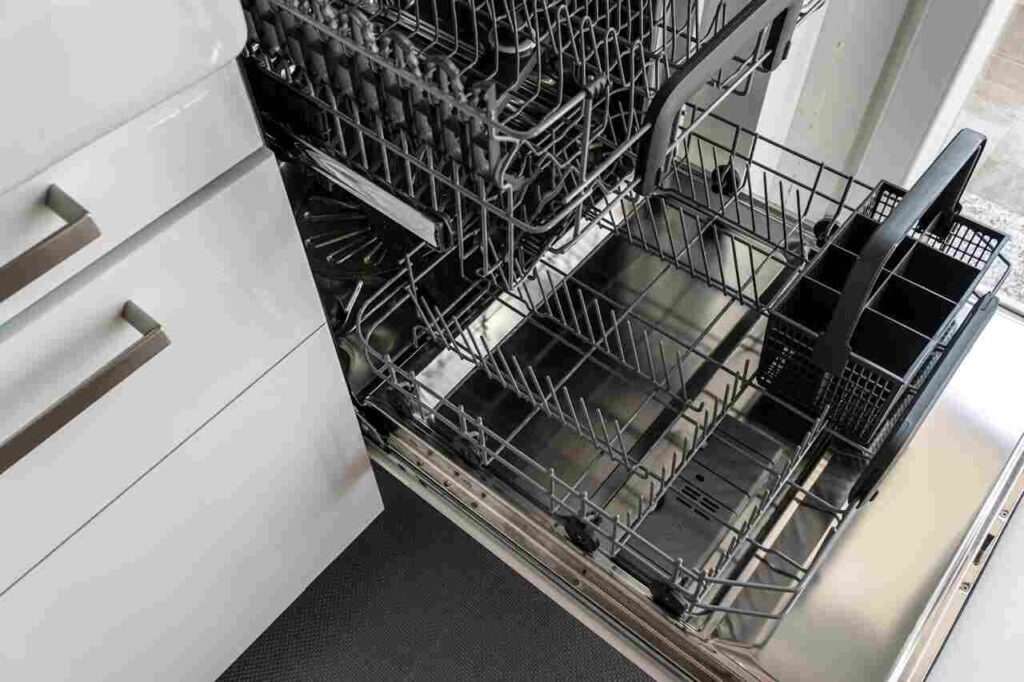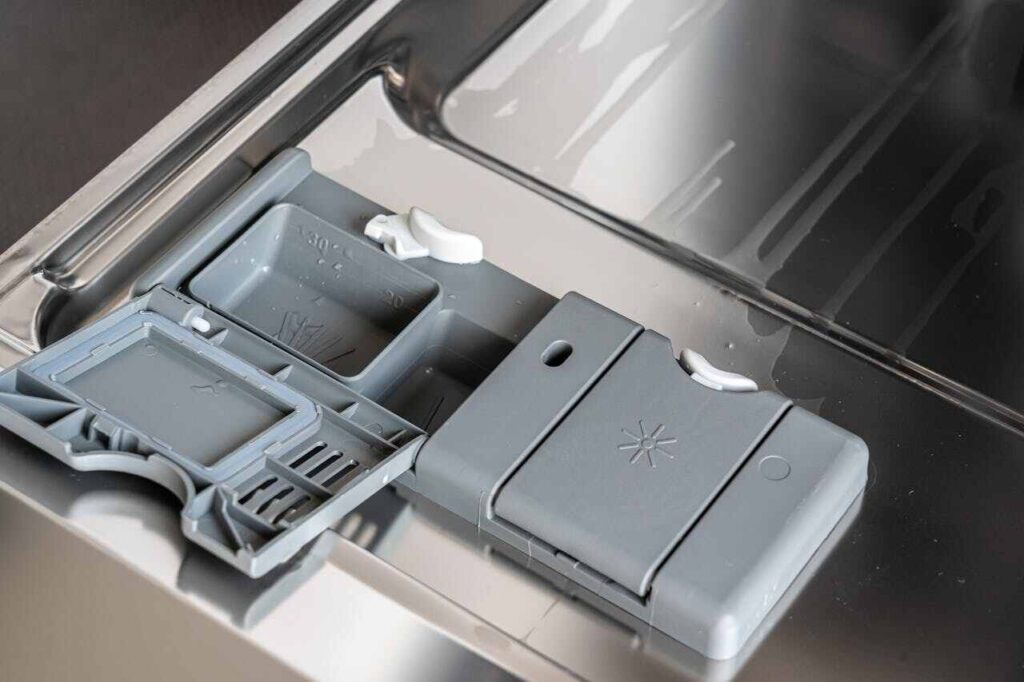Contents
We’ve all been there – putting your dirty dishes into the dishwasher, starting the cycle, and hoping for sparkling clean plates. But when you open it up and find food still stuck to your dishes, it’s frustrating! If your dishwasher isn’t cleaning properly, then with this guide, you’ll learn the common reasons for poor cleaning performance and how you can fix them. And, of course, if the problem persists, it might be time for a dishwasher repair.
Dishwasher not cleaning properly? Here’s what to check
1. Clogged filters
One of the most common reasons for poor dishwasher cleaning is a clogged filter. Filters in dishwashers trap food particles and debris, but over time, they can get clogged and stop doing their job. When this happens, the water can’t circulate properly, and your dishes won’t get cleaned.
How to fix it
To fix this, you need to clean your dishwasher’s filter. Usually, the filter is located at the bottom of the dishwasher. It’s easy to remove, so just pull it out, rinse it under warm water, and scrub away any food or grime. Once it’s clean, pop it back in, and you should see a difference in the cleaning performance. If this doesn’t solve the problem, it might be time to call for a dishwasher repair service.
2. Faulty spray arms
Dishwashers have spray arms that spin and spray water to clean your dishes. If these arms are clogged or broken, they can’t do their job properly, leading to dirty dishes. This is another common issue that can cause poor cleaning performance.
How to fix it
Check the spray arms for any debris or blockages. You can remove them by unscrewing or pulling them out, depending on your model. Rinse them under water, and use a toothpick or small brush to clear out any food particles stuck in the holes. After cleaning, place them back into position, and you’ll likely see better results. If the spray arms are cracked or damaged, a dishwasher repair might be necessary to replace them.
3. Wrong settings
It’s easy to overlook the settings on your dishwasher, but using the wrong cycle or temperature could be the reason your dishes aren’t getting properly cleaned. For example, using a short or eco-friendly cycle might not give your dishes enough time or hot water to get cleaned properly.
How to fix it
Check the settings on your dishwasher and make sure you’re using the right cycle for the type of load you have. For tougher stains, a heavier cycle or higher temperature might be needed. If you’re not sure, consult your dishwasher’s manual for the best settings for your specific needs. If the settings seem correct, but the cleaning issue persists, it may be time to look into a dishwasher repair.

4. Dirty or broken door seal
The door seal (or gasket) is the rubber lining that runs around the edge of your dishwasher door. Its job is to keep water inside the dishwasher during the wash cycle. If the door seal is dirty, cracked, or broken, water can leak out, and your dishwasher might not clean properly.
How to fix it
Inspect the door seal for any cracks, tears, or buildup of grime. If you see any debris, clean it off with a damp cloth. If the seal is damaged, you might need to replace it. Door seal replacements are easy to find, and you can often do this yourself. If you’re unsure, a dishwasher repair professional can help with the replacement.
5. Low water temperature
For your dishwasher to clean your dishes effectively, the water temperature needs to be high enough to break down grease and remove food particles. If the water isn’t hot enough, your dishes may come out looking just as dirty as when they went in.
How to fix it
Check the water temperature on your water heater. The ideal temperature for your dishwasher is usually around 120°F (49°C). If the water is colder than that, your dishwasher may struggle to clean properly. You can increase the water temperature at your water heater, but make sure it’s not set too high to avoid scalding risks. If adjusting the temperature doesn’t help, there could be a problem with the dishwasher’s heating element, and you might need a dishwasher repair.
6. Overloading the dishwasher
It’s tempting to cram as many dishes as possible into the dishwasher to save time, but this can actually make cleaning less effective. If your dishwasher is overloaded, the water and detergent can’t circulate properly, and your dishes won’t get cleaned.
How to fix it
Try to avoid overloading the dishwasher. Make sure the dishes are spaced out, and the spray arms can spin freely. If you have larger items, like pots and pans, place them on the bottom rack where they won’t block the spray arms. This simple adjustment can make a big difference in your dishwasher’s cleaning ability. If overloading continues to be an issue, consider calling for a dishwasher repair to check if any internal components have been affected.
7. Blocked drainage system
A blocked drainage system can prevent your dishwasher from draining properly, leaving dirty water sitting in the bottom of the machine. If you notice dirty water or a bad smell after your dishwasher cycle, this could be the problem.
How to fix it
Check the drain hose for any blockages or kinks. Make sure the drain filter is clean, and inspect the area around the drain pump for any debris. If the drain system is clear, but the problem continues, you may need a dishwasher repair to fix any issues with the pump or drainage system.
8. Using the wrong detergent
Dishwasher detergent is specially designed to clean dishes in high heat and with minimal water. If you’re using regular dish soap or the wrong type of detergent, it can cause poor cleaning performance and even damage the machine.
How to fix it
Use the correct dishwasher detergent, and avoid using regular dish soap, as it can cause excessive suds and clog the dishwasher. You can find dishwasher detergent in powder, gel, or pod form, so choose the one that works best for you. If you’re still having issues, a dishwasher repair might be needed to check for any detergent buildup inside the machine.

When to call for a dishwasher repair
If you’ve checked all of these issues and your dishwasher still isn’t cleaning properly, it might be time for a professional dishwasher repair. Sometimes, the problem could be due to a faulty part, such as the pump, motor, or control board. A professional can diagnose the issue and get your dishwasher back to its best.
If your dishwasher isn’t cleaning your dishes like it used to, there are simple ways to troubleshoot and fix the issues yourself. From clogged filters to faulty spray arms, taking the time to troubleshoot your dishwasher can save you time and money on repairs. But if the problem continues, don’t hesitate to call in a professional for dishwasher repair. With the right help, your dishwasher will be back to cleaning your dishes like new!
